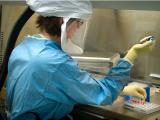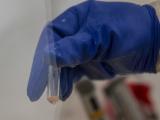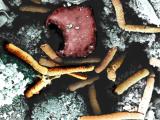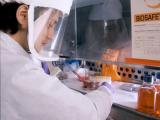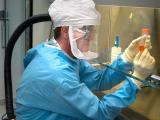Apr 23, 2002 (CIDRAP News) A worker tested positive for anthrax exposure, and anthrax spores were found in two indoor areas near a laboratory where anthrax research was being done at the US Army Research Institute of Infectious Diseases (USAMRIID), the Army revealed last week. USAMRIID is at Fort Detrick, in Frederick, Md.
"USAMRIID has never found pathogenic spores outside a containment lab before, so this is a first," USAMRIID spokesman Chuck Dasey told CIDRAP News. He said the Army will be investigating how the spores escaped from the lab, a biosafety level 3 facility. "We think it's from a breakdown in lab procedures," he said.
The sampling and testing were triggered when a scientist noticed a deposit on a flask in the lab on Apr 8, according to the Army. Two employees who work in the lab initially underwent nasal swab testing, and one of the tests was positive. Both employees had previously been vaccinated against anthrax, and both are taking prophylactic antiobiotics, according to Dasey. No illnesses suggestive of anthrax have been reported among USAMRIID workers.
Initial sampling of surfaces in a hallway and administrative room outside the containment lab in question revealed "low levels" of anthrax spores, USAMRIID officials reported in a news release. The spores appeared to be "highly localized," officials said. Initial decontamination of the area with bleach was completed before the incident was made public Apr 19.
Over the weekend of Apr 20 and 21, workers sampled 800 sites in the building and found only two anthrax spores, the Army said in an Apr 22 news release. "These areas are being decontaminated a second time with bleach. Two additional samples indicated the presence of a vaccine strain of anthrax, which does not cause disease in humans. All other samples were negative for anthrax."
About 100 workers were relocated from parts of the building surrounding the affected area after anthrax spores were found, the Army said in an Apr 19 news release. Other than the small area where spores were found on the weekend, the affected parts of the building were reopened Apr 23.
Besides the two employees who were initially tested, 35 workers asked for nasal swab testing for anthrax exposure, and all tests were negative, Dasey said. Seven workers, all employees of Army contractors, requested and have received antibiotics, he said.
Army officials said it was not clear if the anthrax spores found in the hallway and office area were directly related to the smudged flask in the containment lab. Although USAMRIID is involved in the Federal Bureau of Investigation (FBI) study of last fall's anthrax cases, Dasey said the research in the room in question is part of USAMRIID's core biodefense program and is not related to the FBI investigation. The biodefense research deals with development of vaccines, diagnostics, and treatments for anthrax and other potential biological weapons.
The containment lab involved in the incident is in USAMRIID's main facility, building 1425, the Army said. Dasey said the lab is a level 3 facility, meaning it has the same physical containment features as a level 4 facility (the highest biosafety level), but workers work in scrubs rather than "space suits."
COL Edward Eitzen, USAMRIID commander, told the installation's workforce Apr 22 that the facility is safe and that environmental and occupational health procedures there will be enhanced, the Army said. Dasey said USAMRIID has never had evidence of pathogenic exposure in people who don't work in containment labs.

